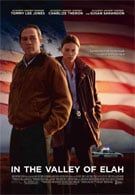In his first directorial effort since the success of 2004’s masterful, already imitated, character connections movie Crash, Paul Haggis has decided to tackle the quagmire that is the Middle-East. By now it’s been done to death on film by other liberal drumbeaters, but Haggis’s anti-war movie does the anti-Iraq salsa with a twist: it takes place on American soil.
In the Valley of Elah is about what happens when our soldiers come back from hell. Hell is a little place called Iraq. Tommy Lee Jones stars as Hank Deerfield, a father who’s soldier son has just returned from the blistering sand of what was once Saddam Hussein’s desert. When his kid lands in the U.S. he’s alive, but within days Hank’s boy inexplicably vanishes and neither the military nor the local authorities seem particularly interested in finding out where he went. Hank, an ex-military police officer himself, sets out to uncover what happened to his kid and in the process discovers a script filled with heavy handed, overbearing moralizing about the evils of the Iraq war.
The problem is that Haggis’s film lacks subtlety. By making a movie about soldiers on American soil instead of on the ground overseas, In the Valley of Elah had an opportunity here, an opportunity to say something smart and substantive by approaching the Iraq war from right angles. Instead, he pummels his audience with his message, and his message seems to be simply this: Unlike any other war in history, the Iraq war is turning our soldiers into serial killers. It didn’t’ happen in Vietnam, but it’s so bad in Iraq that we’re cranking out thousands of Jeffrey Dahmers by sending our boys over there. I’m not overstating here, that’s really the message of Haggis’s movie, and it’s one he’s determined that no one miss.
The real shame of it is that if you take all the politics out, In the Valley of Elah is gripping. Tommy Lee Jones gives a brilliantly understated performance as Hank, while Haggis does a great job of developing and following the mystery of his son’s disappearance. But by the time the movie’s half over, the mystery is already solved and the rest of the film’s running time is spent with Hank trying to come to grips with what’s happened till the movie’s political pontificating eventually boils over and overshadows everything until we’re left with a film that can only be described as un-American.
There, I said it. In the Valley of Elah isn’t just heavy-handed and preachy, it’s downright un-American. Not because it comes out pretty clearly against the Iraq war or because it paints American troops as sadistic monsters. That last bit is a rather harsh criticism, however Haggis isn’t blaming our soldiers but us for what we’ve done to them. He may not be painting the military in the best light, but his goal seems to be to wake everyone up to what they’re going through in an effort to save them, rather than some sort of angry attempt to demonize the individuals fighting the good fight in our armed forces. No, In the Valley of Elah is un-American because it takes a patriot, in the form of Hank Deerfield, and shreds him.
By the end of the movie, our overly patriotic father-hero has abandoned whatever it is that he loved about America in the first place and it’s pretty clear that he hates just about everything his country stands for. More importantly, Haggis seems to think he’s pretty justified in doing it and I got the sense that we’re supposed to feel the same way too. If that’s not un-American then I don’t know what is. Lucky for Haggis, free speech covers even that, but that doesn’t mean we have to like the way he goes about it. Haggis reduces America’s problems to a series of slanders and then hangs a flag upside down just to bully home the point. It’s too much, and whatever good there is in Elah (and there’s a lot of it), is often overshadowed by Haggis’s political billy club.
Most Popular






